It’s time for my first book reviews of summer! Today’s batch of reviews includes a heartwarming novel by a new-to-me author, some historical fiction, an atmospheric thriller, and two compelling nonfiction reads. Let’s get to the reviews!
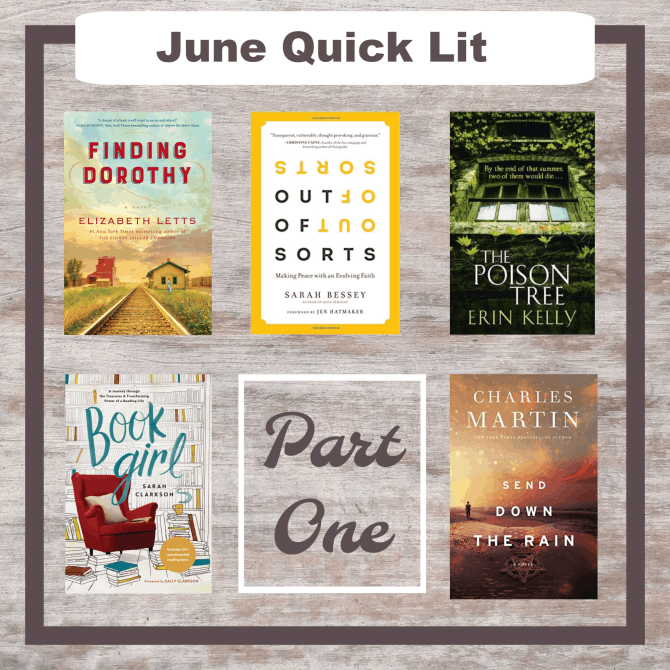
Out of Sorts: Making Peace With an Evolving Faith, by Sarah Bessey: Many Christians who have been hurt by the church, or who have started to question God’s goodness or presence in their lives, are quick to turn their backs on Him and abandon the faith. I love seeing Christians who, when faith gets tricky, are comfortable asking the big questions of God, who wrestle with their faith, and who come out loving Him even more wholly. This is the story of Sarah Bessey as she tells it in Out of Sorts.
Sarah Bessey begins her book by emphasizing “this book isn’t an argument to make or a point to take. . . it’s about loss and how we cope with change. It’s about Jesus and why I love Him and follow Him. It’s about church and church people and why both make me crazy but why I can’t seem to quit either. It’s about embracing a faith, which evolves, and the stuff I used to think about God and don’t anymore, and it’s about the new things I think and believe that turned out to be old. It’s about the evolution of the soul and the ways I’ve failed. . . It’s about making peace with unanswered questions and being content to live the answers as they come.”
Through sharing her own journey of deconstructing and subsequently reconstructing her faith, Bessey helps readers grapple with some of the harder aspects of Christianity. Some issues are sorted out, others are left open and prickly. Even as she remains unresolved in elements of her own theology and orthopraxy, she remains secure in her love of Christ and points her audience to Him.
Having read quite a few of these faith memoirs, many of the concepts in this book were not new to me: Bessey’s journey is not unique, nor are her observations and answers. However, I appreciated her gentle approach, which combines humility, vulnerability, and ultimately a deference to Christ (something lacking in many similar books). I particularly resonated with her thoughts on suffering, her willingness to adopt from numerous Christian faith traditions (she is an evangelical Christian who speaks in tongues and celebrates the liturgical calendar!), her ideas on avocational ministry, and her approach to studying Scripture .
Bessey is a strong writer, a deep thinker, and a relatable question-asker. While I enjoyed her first book (Jesus Feminist) more, I’m glad that I read this.
My Rating: 4 Stars.
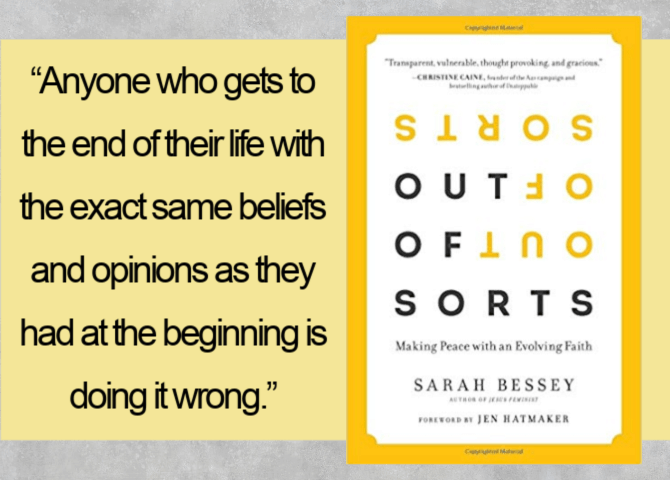
Book Girl: A Journey through the Treasures and Transforming Power of a Reading Life, by Sarah Clarkson: Sarah Clarkson’s identity as a Book Girl began while she was still in the womb, when her mother read stories aloud to her tiny daughter-to-be. Clarkson was raised in the company of Anne of Green Gables, explored Narnia alongside the Pevensie children, and modeled her young adulthood after Austen’s bold heroines. As she grew as a reader, books continued to shape her life and worldview, guiding her blossoming faith and molding her into a lifelong learner with an eye for wonder, the courage to face struggles with hope and faith, and a willingness to embrace her own story.
In her introduction, Clarkson writes that “Book Girl is also my witness to the fact that the reading life is a gift, one I received largely from the wise women in my life whose generosity was expressed in the sharing of books that taught them to live with humor, humility, and grace.” Throughout the book, Clarkson argues that books can broaden your world, spur you to action, cultivate imagination, foster community, reignite hope, and deepen the soul. Through more than twenty annotated book lists, she shares the specific titles that have had a profound impact on her life and faith and encourages readers to join her in discovering the wonders and insights each of these books has to offer.
I enjoyed finding a kindred spirit in Sarah Clarkson. I, too, am a lifelong Book Girl and have been profoundly shaped by the books in my life—from the picture books my parents read to me as a child to the classics I studied in school to the spiritual memoirs and contemporary novels I read today. I’m in full agreement with Clarkson about the power of books and I appreciated her thoughts on the importance of story, particularly the ways that literature overlaps with the spiritual life. Her ideas on introducing children to reading are also wonderful and I would like to read her book dedicated to this subject.
Clarkson and I have very different literary tastes. Although I have read a majority of the books she cites as essential reading, few are personal favorites. While Clarkson prioritizes the classics, I tend to favor more contemporary reads. I’m also less of a “book snob” than Clarkson in that I find value in reading all types of books, not just the “important” ones. Clarkson presents Book Girl as a guide for those getting started in their own reading lives, but the books she suggests are not those I would personally recommended to someone who is not already well-read.
Although our tastes differ, I did enjoy Clarkson’s reflections on each title and her explanations of how the books have shaped her. However, I regret listening to this book on audio: listening to long series of book lists grew tedious (especially since many of the lists are repetitive—C.S. Lewis, Tolkien, and Madeleine L’Engle appear in nearly every one) and I’m sure I would have appreciated the lists more if I had taken them slowly, using this book as more of a reference guide instead of reading it straight through.
This book will be beloved by fellow readers, but likely won’t be appreciated by those who haven’t already warmed to the bookish life.
My Rating: 4 Stars.
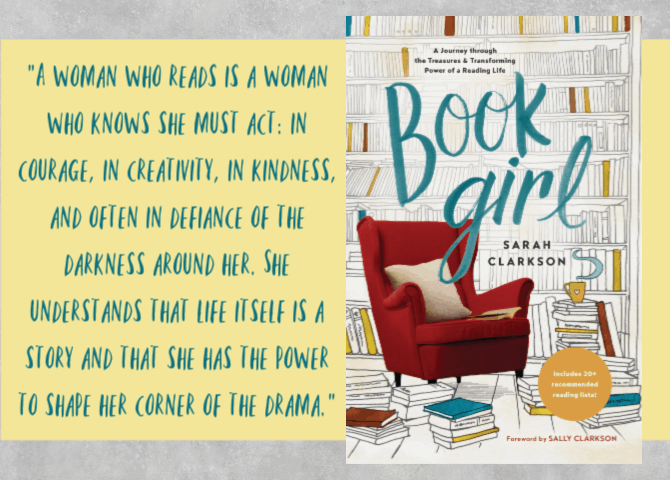
The Poison Tree, by Erin Kelly: The Poison Tree opens with Karen and her nine-year-old daughter, Alice, returning home from picking up Alice’s father, Rex, from his ten-year stint in prison for murder. Karen and Alice have been on their own since Rex’s incarceration, which has been longer than Alice has been alive. Now the trio is settling into life as a family of three for the very first time. As the family navigates the ups and downs of Rex’s return, Karen struggles to escape past ghosts and to forgive herself for secrets she has been harboring for the last decade.
The story flashes back ten years, to the summer of 1997. Studious 20-year-old Karen is on the verge of graduating from college when she has a chance encounter with an enigmatic girl named Biba. Karen is immediately taken with the Bohemian Theater Major and decides to leave her quiet, safe home with her three snooty roommates for life with Biba and her brooding older brother, Rex, at their dilapidated family mansion. A summer of drugs, alcohol, sex, and carefree living ensues; Karen quickly adjusts to the flamboyant, reckless lifestyle . . . until a tragic event brings the romantic summer crashing to a halt, and the lives of these three friends are forever altered.
I picked this up immediately after finishing He Said/She Said because I was enamored with that book and couldn’t wait to dig into Erin Kelly’s backlist. Compared with that spectacular thriller, The Poison Tree is notably subpar, though still a decent read. The characters are evocative and the foreboding setting and slow-burning suspense kept me reading. I also found Karen’s polylinguist skills intriguing, and I was touched by her close, attentive relationship with her daughter.
Though it is a fast-paced, increasingly haunting novel with an excellent climactic event and some intriguing twists, The Poison Tree is much less polished than He Said/She Said. (I likely would have enjoyed this more if I didn’t spend a majority of the book comparing the two; next time I’ll space out books by the same author!). The constant foreshadowing grew tiresome after a while, and I wished there was a more engaging present-day storyline to complement the chaotic backstory. Unlike He Said/She Said (which I loved except for the ending), The Poison Tree has a fantastic conclusion that served to redeem much of the book’s weaker elements.
My Rating: 3.5 Stars.
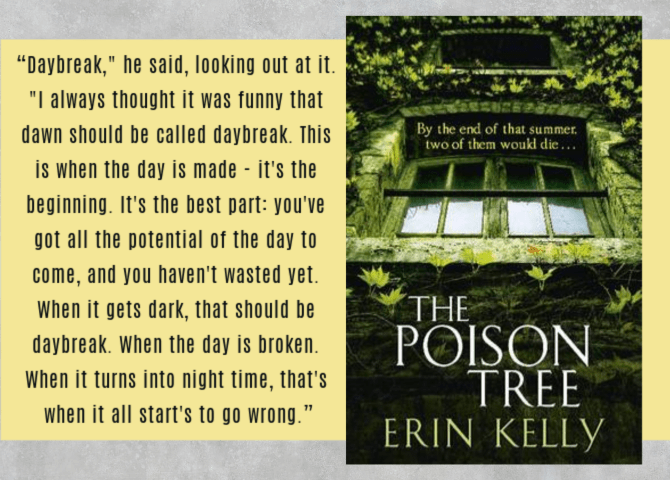
Finding Dorothy, by Elizabeth Letts: In Hollywood, 1938, seventy-seven-year-old Maud Gage Baum weasels her way onto the set of The Wizard of Oz, eager to see her husband Frank’s legendary children’s book brought to life for the big screen. Nineteen years after Frank’s passing, Maud knows it’s up to her to see that the integrity of the novel is preserved within the groundbreaking film. Maud is disappointed by the directors, the film crew, and the script, but immediately warms to the young and naïve Judy Garland and takes it upon herself to become the girl’s friend, advocate, and mother figure while on set.
Between scenes from the Hollywood set, we flash back over Maud’s storied life, from her youth as a pioneering suffragette’s daughter, to her brief stint at an Ivy League school, to her blossoming romance with actor L. Frank Baum and their long, difficult life together. Through her story of raising four boys, struggling to survive on the prairie, and taking odd jobs to fill in the financial gaps her entrepreneurial husband was unable to fill, we see the seeds of what eventually became the Oz stories. And we grow to understand why The Wizard of Oz is so dear to Maud’s heart and why she’s determined to see the movie succeed.
Though written as fiction, the novel closely follows the real-life stories of Maud Baum and the making of The Wizard of Oz. I’m a massive fan of the movie (one of my Top Five favorites), so it was no surprise that I loved the behind-the-scenes movie trivia and especially Maud’s interactions with Judy Garland, who is impossible to dislike. I had a harder time getting into the story of Maud’s past. The book covers too much ground to really get a feel for the characters. It didn’t help that Maud Baum was a hard, rather unlikable woman in her younger years (though quite endearing in the later Hollywood scenes). However, I was fascinated by the depiction of childbirth in the 1800s and the descriptions of life in the Dakota territories, and I enjoyed seeing the interplay between the family’s story and Baum’s writings.
I would highly recommend this book for fans of The Wizard of Oz movie, those interested in the women’s suffrage movement, or anyone who loves historical fiction with concurrent storylines.
My Rating: 4 Stars.
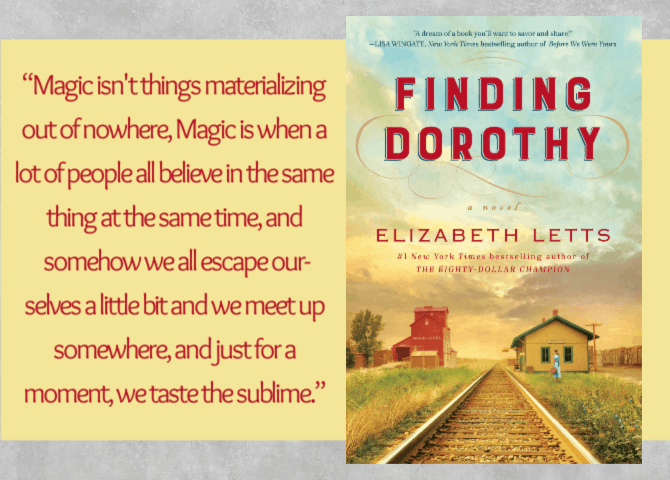
Send Down the Rain, by Charles Martin: Joseph, a Vietnam War Vet, has been adrift for years, moving from one new life to another as he attempts to outrun his demons and make amends for the wrongs he committed while serving overseas. Now in his early sixties, Joseph has finally resolved to give up the search for peace and live out the rest of his days in a remote cabin in the Carolina mountains. But his solitude comes to an end when he encounters a young mother and her two small children who are in desperate need of help. Ever one to assist those in need, Joseph agrees to drive them back to their family in Florida.
The trip returns Joseph to his home town, where he encounters his childhood sweetheart, Allie, who is still reeling from the death of her second husband in a horrific highway accident. The accident not only cost Allie her marriage, but also the beloved waterfront restaurant that had been in her family for years. As Joseph helps Allie get back on her feet, the two rekindle their friendship. . . and possibly something more. But soon, secrets from their pasts begin to emerge and threaten to tear the couple apart.
I had never heard of Charles Martin prior to his appearance on the That Sounds Fun podcast. Annie Downs is apparently a massive Charles Martin fan, and her enthusiasm peeked my interest enough to give his books a shot. I decided to begin with this, his most recent novel. After the first few chapters, I was skeptical: this appeared to be a less racy version of a Nicholas Sparks novel (which I do not care for at all). However, as the story unfolded, I was pleasantly surprised. Though the storyline required quite a bit of suspension of disbelief on my behalf, I was soon captivated by the mysterious, complex character of Joseph, and wanted to know more about what happened to this remarkable man that could transform a hard-hearted Veteran into such a generous, deeply compassionate individual. I admired his integrity (especially in the context of his relationship with Allie) and ached for the soul that was so obviously wounded.
Powerful themes of redemption, sacrifice, and grace are woven through the story—obvious embodiments of the Gospel, though this is never explicitly stated. Martin also touches on difficult themes of immigration, war-related trauma, generational disfunction, addiction, and the justice system—all of which are handled tactfully and contribute to, rather than detract from, the primary stories.
Martin’s writing is a tad saccharine, but also vivid, introspective, and emotionally astute. He manages to tell a wonderful story that is more poignant than any sermon ever could be, but never feels preachy. I’m looking forward to checking out his backlist.
My Rating: 4 Stars.
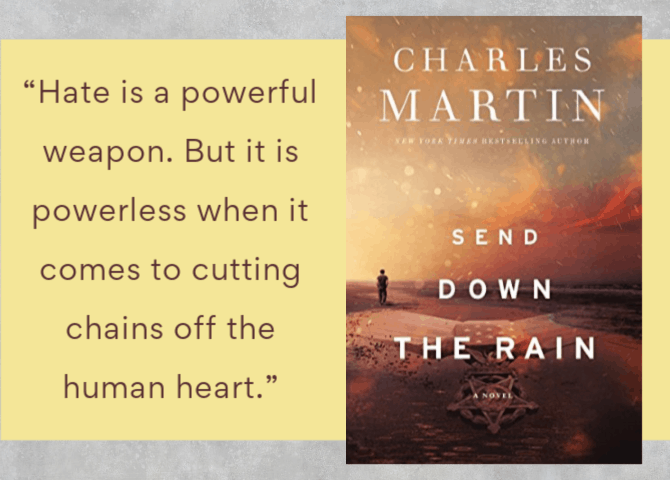
Have you read any of these titles? What did you think?